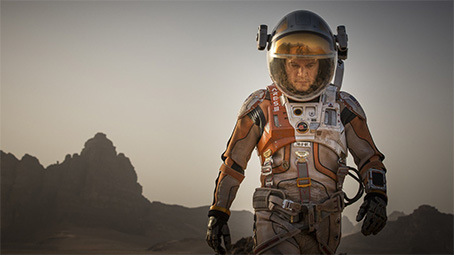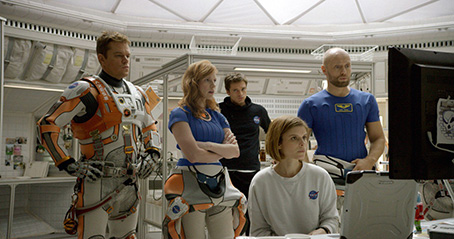"Oh, I've never actually heard someone capture scientists the way Andy has
captured them. It sounded like the scientists talked in my town. So my job as a
screenwriter was less about getting the actual science right, because I trusted
Andy. I mean, he's the smart one. But my job was to just make sure that they
sounded the way I thought scientists should sound, if that makes sense." |
Screenwriter Drew Goddard * |
In an odd piece of leisure-time timing, I found myself almost exactly halfway through Andy Weir's novel The Martian at the same time I found myself in the cinema watching the movie. This didn't bother me unduly despite the multimillion dollar vision of one Sir Ridley Scott providing some of the most spectacular spoilers a novel reader has ever had placed in front of them. To be fair, the precise endings of both book and movie are slightly different in two small regards (the identity of a space walker and a coda which isn't in the novel). But without doubt, the story of The Martian, despite its cleverness, its celebration of science and its inexplicable tension, you just know that not only is stranded astronaut Mark Watney (a charismatic Matt Damon) not going to die, neither are any of his colleagues. I don't think this is a spoiler for one specific reason. The entire premise of the story absolutely depends on no one dying. Yes, there is great risk throughout, but if a single astronaut dies trying to rescue another single astronaut, the story cancels itself out. For this reason, I'm flabbergasted it's dramatically as successful as it is and shocked it has such a strong sense of jeopardy given, like a James Bond movie, we just know our hero's not going to die... I guess the joy of the film is witnessing exactly how he's not going to die...
The narrative is pretty basic: Robinson Crusoe on Mars... A team of NASA explorers on the Red Planet is buffeted by a vicious sand storm. Apparently the air is not dense enough on Mars to whip up such a tempest, an admission of inaccuracy that author Andy Weir is happy to take responsibility for. Does this matter? Not one bit. A communications dish breaks loose, slams into one of the astronauts and the crew has no choice but to leave him, missing presumed dead. The remaining crew of the Ares III mission heads back to Earth unaware that team botanist Mark Watney is injured but by no means out of the game. After a bit of judicious self-doctoring (there are those staples from the surgery-pod in Prometheus again), he realises that he is four years away from a potential pick up (the next scheduled Ares mission) and to be rescued he has to travel over 3,000 kilometres to reach the launch ship, a piece of hardware having already been delivered to the planet well before the Ares IV team are set to arrive. Problem. He's on Mars... Not enough oxygen, food, water and digital entertainment apart from his commander's collection of 70s TV and disco music, something you know she's going to pay for later down the line... "First I was afraid, I was petrified..." I'll let you fill in the rest of the lyric.

So begins a series of systematic problem solving and to those interested in science and engineering, here is the greatest recruiting film for engineers the world has ever seen (so said physicist Brian Cox, the BBC's face of science, one half of the two hosts of the rather brilliant Radio 4 programme The Infinite Monkey Cage). And the aspects that save the entire exercise from being just indulgent science stuff are Matt Damon and novelist Andy Weir's infusion of black and spirits-raising eccentric humour. Matt Damon, as Sight and Sound has already pointed out, was in fact the titular Private Ryan. What is it about this actor that Earth and Heaven both have to be moved to save his ass? OK, Damon has integrity and he's also on the right side (as in the left) of political debate (his disbelief that the GOP would front a woman of almost spectacular naiveté – OK, that's being polite to Sarah Palin – for one of the highest political positions in the country staggered him. Check out the interview. It's on you-know-where.) He can be authentically self-effacing with a basic and heartfelt connection to 'the common man' (whoever he or she is) despite his very American good looks and rugged physique. Who am I kidding? This guy can do anything. I'm not getting caught out again after the debacle of "They're casting who as Jason Bourne?" Author Weir's humour is intact (Goddard made very few changes to the dialogue, trusting Weir's science) and this stops the whole exercise from being a big budget "Why Don't You Switch Off Your Television Set And Go And Do Something Less Boring Instead" with added explosions. For our non-UK readers, this was an actual BBC children's TV show, one of Russell T. Davies' first jobs at the corporation. Yes, it's the same RTD who kick started Doctor Who in 2005. The show exhorted the screen-addicted of the 70s, 80s and 90s to go and actually live their lives. Things have not improved in that regard. And worse, we don't have that show anymore. That's your actual irony. I remember the show with a large dollop of embarrassment and You Tube has not revised that opinion. The march of time...
More than any filmed novel I've been familiar with, The Martian is pretty much gathered (apologies Drew) word for word from its source. It's true that most of the secondary characters don't get much shading ("Hi, I'm a NASA guy. What? There's bad news? Oh no!" just about covers them) but you're with Matt from the off and the wide-angle log entry cliché helps the character to explain his actions (to we dummies, we happy dummies in the audience who are not overly familiar with hydrazine, extraterrestrial botany and freeze-dried poo). In fact, so used to the log entries do we become, Scott sneaks in a few where the character definitely wouldn't be recording so we drift rather cleverly in to House of Cards territory. That said Matt Damon's Mark Watney is far less repulsively manipulative than Kevin Spacey's Francis Underwood even if the pair of them are smashing down the fourth wall. While the novel is written mostly from the perspective of the stricken astronaut with occasional wanderings back to NASA just to clarify what's being done to help him, the movie pushes these scenes a little more front and centre. And with such an illustrious cast why wouldn't you? How Sir Ridley lined this lot up is beyond me. I guess stars are queuing up to work with the 77 year old. Jeff Daniels plays the head of NASA, Chiwetel Ejiofor, the mission director, Kristen Wiig (yeah, I know! Kristen Wiig!) plays a NASA spokesperson and Sean Bean is here too as another NASA director but one who has to go against the logic of huge risk to six weighed against small risk to five and huge risk to one... There are many more familiar faces but as I said the secondary characters don't make a huge impression (or the screenplay doesn't really allow them to) except for perhaps two of the astronauts who end up going after Watney. Jessica Chastain, the go-to girl for smart characterisations and cool beauty (it is show business after all) plays Lewis the Ares III commander who's suffering some guilt at leaving Watney behind. Kate Mara (it was a crime to make her invisible in the misfire that was The Fantastic Four) plays Johanssen, the super smart whiz kid who's responsible for all the cosmic calculations. She makes each of her pronouncements appear as if she's letting the information out by cover of darkness with a twinkle in her eye. And she's fast too.

As you might expect, the location work in the red desert of the Wadi Rum in Jordan is as believable 'a man on Mars' scenario as you're going to get. Digital enhancements of the sets and the effects in general are top notch but then that's almost a given these days even though it really shouldn't be. Even if you're not a fan of CG, you cannot but marvel at what these artists can fool you into believing. Christopher Nolan shot his spaceship hardware for real. Scott's space ships are digital VFX. I could only find one confirmation of this but it makes sense as the Prometheus craft in uh... Prometheus was also digital. It makes little odds, as all the effects are utterly believable. There was one crowbarred effect that tried to go by unnoticed but it wasn't as 'thrown away' as it might have been. Damon has been living on cubes of bread and potato pieces so dramatically loses weight. There's only one shot to show this. A very thin, bone-visible Damon passes by the camera. Because of the way it's shot, Damon's face is kept in the shadows, with a towel on his head. His thin body double is OK but a little more effort would have been nice to sell the audience a thin Damon. Once he has his space suit on again, he may as well be Schwarzenegger under those layers.
It's been reported that Scott chose to direct The Martian over a sequel to Prometheus. This is the very definition of cinematic dissonance on my part. Prometheus was so frustrating so a sequel might actually satisfy and clarify but then we would have missed out on The Martian which, if nothing else, is the best two hour advert for manned Mars missions ever made. I'm a fan being a child of the space race and Apollo moon landings. I was eight when Armstrong landed on the moon, some may say a perfect age for stargazing. But politically, I do understand than there is a great deal of poverty and injustice that can be fought with hundreds of millions of dollars. It comes up very sketchily in the film, the idea of why they are spending so much money, time and resources on one man. The head of NASA says it's probably not right to do so (cut your losses and bring the other five home safely) but Sean Bean goes against this and underlines that Watney's life is important enough for the expense and the effort. Author Weir tucks in this inconvenient point right at the close of his book... The reason Watney thinks he was rescued is that, and I quote:
"Part of it might be what I represent; progress, science and the interplanetary future we've dreamed of for centuries. But really, they did it because every human being has a basic instinct to help each other out. It might not seem that way sometimes but it's true."
While I can understand this reductionist view of the human animal, I have to admit that I was also imagining what a few hundred million dollars might do to alleviate the Syrian refugee crisis. But perhaps that's just as much pie in the sky as the rescue of Mark Watney... But then one of those scenarios is fictitious... The Martian is a good solid escapist adventure/survival yarn, as safe as houses and more exciting than it has a right to be given its predictability. Recommended for an undemanding night out.
* http://www.comingsoon.net/movies/features/618313-interview-drew-goddard-on-adapting-andy-weirs-the-martian#/slide/1
|